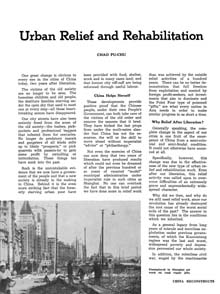One great change is obvious to every eye in the cities of China today, two years after liberation.
The victims of the old society are no longer to be seen. The homeless children and old people, the destitute families starving under the open sky that used to meet one at every step - all these heartbreaking scenes have disappeared.
Our city streets have also been entirely freed from the scum of the old society - the loafers, pickpockets and professional beggars that infested them for centuries. No longer do predatory rascals and gangsters of all kinds sidle up to likely "prospects," or pick quarrels with passers-by to gain some profit by swindling or intimidation. These things too have sunk into the past.
Such is the unmistakable evidence that we now have a government of the people and that a new society is already in the making in China. Behind it is the even more striking fact that the formerly starving urban poor have been provided with food, shelter, work and in many cases land; and that former city riff-raff are being reformed through useful labour.
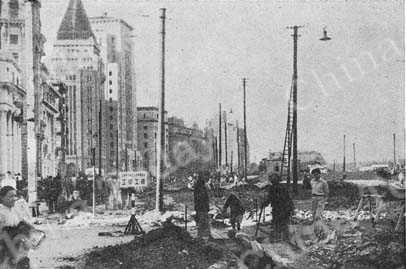
Unemployed in Shanghai get work on road repair jobs.
China Helps Herself
These developments provide positive proof that the Chinese people, under their own People's Government, can both take care of the victims of the old order and remove the cancers that it bred. They have kicked the last props from under the moth-eaten slander that China has not the resources, the will or the skill to move ahead without imperialist "advice" or "philanthropy."
Not even the enemies of China can now deny that two years of liberation have produced results which could not even be dreamed of after the previous hundred or so years of vaunted "model" municipal administration under imperialist rule in such cities as Shanghai. No one can overlook the fact that in this brief period we have done more in relief work than was achieved by the outside relief activities of a hundred years. There can be no better demonstration that full freedom from exploitation and control by foreign profit-seekers, not investments that aim to dominate and the Point Four type of poisoned "gifts," are what every nation in Asia needs in order to make similar progress in as short a time.
Why Relief After Liberation?
Generally speaking, the complete change in the aspect of our cities is one fruit of the emergence of China from a semi-colonial and semi-feudal condition. It could not otherwise have occurred at all.
Specifically, however, this change was due to the effectiveness of the new type of urban relief and rehabilitation work. Even after our liberation, this relief activity was called upon to overcome difficulties of an extremely grave and unprecedentedly widespread character.
Why did we then, and why do we still need relief work, since our revolution has already destroyed the root cause of the worst social evils of the past? The answer to this question lies in the conditions which we inherited.
As a general legacy from long years of misrule and merciless exploitation under previous governments, of which the Kuomintang regime was the last and worst, widespread poverty and depression permeated our whole society.
In addition, the relentless civil war, waged by the reactionaries against the People's Liberation Army, afflicted the people with calamities even worse than those of the Japanese invasion which had preceded it. Not only did the people lose their sons through conscription and their livelihood through taxes and requisitions They were often unable, as a result of the war, to continue normal agricultural activity and such work as the repair of dykes. The crop-failures and floods that resulted cost the lives of millions and turned other millions into homeless refugees. Besides the refugees, the cities swarmed with hundreds of thousands of disbanded Kuomintang army men, many of them completely demoralized.
Following liberation, finally, our coastal cities were subjected to naval blockade and wanton air-raids by the brigand Chiang Kai-shek and his U.S. backers. This resulted in more loss of life, destruction of houses and temporary dislocation of trade and industry.
As a consequence, our cities were full of unemployed, whose number was constantly augmented by refugees from the countryside. Every morning produced thousands of castaway infants, whom their parents had abandoned in desperation. Old people and cripples wandered, hungry and without aim, waiting only for death. Prostitution assumed monstrous proportions. Tuberculosis, venereal infections and various epidemic diseases reached unheard-of heights.
In Shanghai alone, over 800,000 persons were without any means of support and were classified as completely destitute.
The Evil Heritage
Cities like Shanghai had been strongholds of imperialist, feudal and bureaucratic-capitalist rule. They had developed as centres of commerce and ruling-class consumption rather than of healthy national industry. Their existing industries were largely geared to export markets most of which had become unavailable, and to the cheap-labour processing of imported raw materials which had stopped coming in. Even at their most "prosperous," they had been factors in the exploitation of the country instead of its healthy development. The problem in such cities, therefore, was not merely to get the wheels of industry turning but to reorient their whole economy.
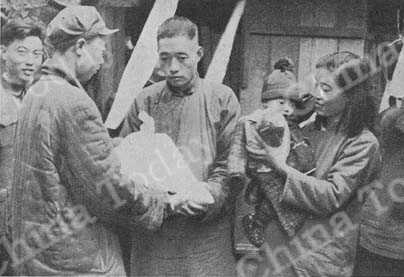
An unemployed worker is deeply touched as he gets a sack of grain collected by workers in the factories.
Deep-rooted conditions of this kind clearly call for relief. Just as clearly, they cannot be solved by relief alone. They can only be successfully tackled by relief, rehabilitation and basic economic reconstruction bound into one indissoluble whole under a common plan.
The First Steps
Self-help and mutual aid in the cities themselves, and mutual aid between the afflicted cities and all other parts of the country, were the key to the relief effort after liberation.
In the first period, rural areas were called upon to help the city. On a rough estimate, more than 1,000,000 unemployed and immediately unemployable persons in eight main cities - Shanghai, Peking, Tientsin, Nanking, Wuchang-Hankow, Canton, Sian and Tsingtao - were dispersed among the villages and accommodated in agricultural production. From Nanking alone, 280,000 out of a total of 400,000 unemployed were decentralized in this way. They in turn helped the villages to increase productivity with their energies and skills.
Persons re-settled from the cities were received with warm kindness and assistance by the village people. On the other hand, people remaining in the cities raised large sums of money to help rural refugees from famine-stricken areas, who were gradually re-equipped and repatriated. Winter clothing campaigns to help flood and drought victims in Anhwei, Kiangsu, Hopei and Honan provinces, regions devastated by flood, brought in 6,800,000 warm garments from the cities.
Kuomintang army men stranded in the cities were also successfully resettled. In the Central South Region alone, 699,418 were shifted to the country in the short space of six months, at a cost of more than 9 billion yuan.
The cities were made safe and social order restored through the removal of thieves, professional pan-handlers and loafers, who were put to work on various projects. A "New Man Village" for 10,000 such persons from Shanghai was set up in the nearby Kwanyuan reclamation area, in north Kiangsu province, where these former parasites are now both helping the country and laying the material basis for a secure, productive, and prosperous life for themselves.
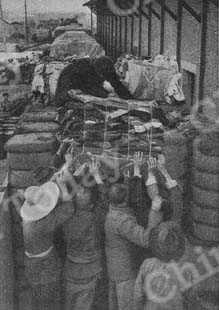
Donations to the great winter clothing relief drive for flood refugees are packed for transport.
Prostitution is ceasing to exist in our cities. Leading the nation, Peking has been entirely cleansed of this social evil. The "special quarters" infamous for hundreds of years can no longer be found. Many of the women, freed from the grip of procurers and trained in various skills, have secured good jobs, married and begun an altogether new life. A few of them have begun to work in various cultural fields.
A common saying in China nowadays is that the old society turned human beings into devils, while the new society turns devils into human beings!
Fighting Unemployment
In another phase of urban rehabilitation, assistance has been given to 789,937 unemployed workers and intellectuals out of a total of 1,500,000 throughout the country. The assistance has taken many forms: assignment to jobs, outright financial relief, provision of temporary work and subsidizing living expenses while the beneficiaries learn new skills.
Municipal construction projects, already undertaken on a considerable scale, are absorbing large numbers of the unemployed. If we assume that each person receiving such aid has three dependents, we arrive at the figure of 2,000,000 persons supported by these measures of relief and rehabilitation.
It must be remarked here that unemployment in our country is a product of the past and will soon be a thing of the past. This is already the case in Northeast China. Cities like Dairen and Harbin, which were liberated before the rest of the country, have been thoroughly rehabilitated and are rapidly acquiring new industries. In these places, there is no unemployment whatsoever. On the contrary, there is a sharp shortage of both industrial and intellectual workers, despite the fact that many persons from other parts of the country have already taken jobs there.
Improving Health and Welfare
While the problem of food has been solved and that of work is on its way to solution in all our cities, positive measures are already being taken on a wide scale to improve health, welfare and education.
Health centres and creches are appearing in all working-class areas, to give free medical assistance and care for the children of women workers and office employees. Hospital and maternity care is now available, free or for a nominal charge, to a much greater section of the city people than could ever hope for it in the past.
In Shanghai and Tsingtao, "youth villages" and special primary schools have been set up for children who a short time ago were homeless. As financial and economic conditions improve, other cities are acquiring similar institutions.
In Harbin there are public wedding halls and funeral parlours which can be used entirely free of charge.
China is no longer a country that depends on relief from the outside. On the contrary, we have already begun to help others.
Vice-Premier Tung Pi-wu of the Central People's Government set this as a definite policy, in a speech at the All-China People's Relief Conference in Peking. He said that relief and welfare work in our cities is no longer to be limited to "saving ourselves" but must henceforth also include "helping others."
This injunction is being carried out. Funds and supplies have been collected in large amounts for the relief of war sufferers in Korea and of Chinese refugees who have returned home from that country. In response to the call of the Chinese Red Cross Society, great numbers of doctors and nurses in many cities have formed volunteer medical teams and gone to the Korean front.
Chinese relief organizations in all big cities are aiding overseas Chinese refugees who have been compelled to leave their establishments, residences and other property in Malaya, Siam and the Philippines as a result of political and national persecution. Returning to China they have been warmly received by the people wherever they have settled, and have received financial assistance, shelter and care.
Eliminating Imperialist Influence
Obviously, none of the new tasks of relief work in China could be carried out by organizations based on the old ruling-class concept of "charity", or by those operated or influenced by imperialism.
A necessary preliminary, therefore, was the ridding of welfare organizations in our cities of all traces of imperialist control and attitudes, particularly those of the ruling groups of the United States who have so amply proved their enmity to the Chinese revolution both before and since its victory.
The fruits of imperialism in the relief field have been fully exposed.
In the worst cases, it produced mass extermination of Chinese children. This was proved by the death pits found in a number of "orphanages" and by their own statistics, revealing a death-rate of 99%. Such institutions, needless to say, have been reformed, while the criminals responsible for their abuses have been punished or deported from China.
In even the "best" cases, however, the minds of beneficiaries of imperialist relief were bent into subservience to the very forces whose exploitation of China was responsible for their widespread poverty. In practically all cases relief was misused for improper interference in Chinese political life. In many, it served as a cover for foreign intelligence activities, frequently including recruiting of agents and military espionage. All such patterns of "relief" are being effectively uprooted at the present time.
Great changes have also come about in relief and welfare institutions run by Chinese nationals but largely or wholly dependent on subsidies from the United States. These were formerly under the indirect influence of imperialism. Now they have been re-oriented to a new base of support in the Chinese government and society. Freed of dependence and divided loyalties, they now have a single aim - service to the people.
Such basic policy changes have been immediately reflected in the rapid development of self-respect among the beneficiaries of relief. They see themselves in a new light. They learn that, acting collectively, they have the strength to overcome their difficulties. Daily they see indications that their future is secure, that the new China which is being constructed will assure their welfare and will not long tolerate the conditions that make relief necessary.
Former paupers now recognize their own responsibility toward their people and their country. A concrete example can be found in the orphanages and other child welfare institutions of Shanghai. After these organizations were taken over and completely renovated, a new life began for the children. This filled them with the desire to do something in return for the fortunate turn of events in their lives. This past summer, 502 of the teen-agers volunteered for special medical training schools and pledged their future to serving the people. This is but one example. It has been duplicated many times over.
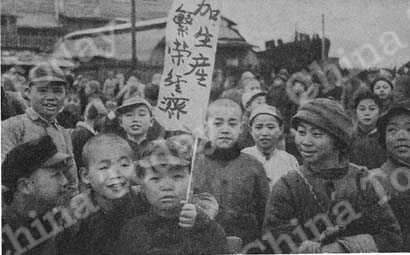
These youngsters lived in the streets and had no hope till they went to "New Man Village."
Relief work in China today is integrated with our entire programme of peaceful national reconstruction. Such coordination is guaranteed by basic relief policies laid down by the Central People's Government and the main goals it lays down from time to time. In deciding the actual programme to be carried out in any given place, local conditions and requirements are carefully studied. There is no undifferentiated, blanket approach.
Principles and Procedures
Relief is not conducted independently in each locality. It is recognized that urban and rural relief are inseparable. Refugees cannot be resettled from cities to the land without the aid of the villages. The villages cannot lessen the burden on the cities unless they themselves receive aid which the cities can give, in tools and supplies.
Close and friendly contact is maintained with government organs. No large-scale medical work can be done, for example, without cooperation with Public Health Bureaux. Big groups of people cannot be moved without help from transportation authorities. Loafers and underworld characters cannot be turned to production without assistance from the Public Security Bureaux. Resettlement cannot have satisfactory results if responsibilities are not assumed by the trade, industrial and publicity departments of local and regional administrations.
Relief and welfare activities can only be on a puny scale if they do not involve the masses; they can accomplish important tasks only when they themselves are a form of mass action. In the new China, labour unions, peasant, youth and women's associations, the cooperatives with their millions of members, as well as other public organizations, have been drawn into the work. Their great pooled strength provides a sure base for a wide and many-sided attack on every social evil. It was in this way that the drive for relief funds for unemployed workers and winter clothes for the village poor was successfully carried out all over the country.
The solid accomplishments of the past two years prove that the Chinese people can perfectly well put their own house in order, overcoming all difficulties. Mainly benefitting the working population, our relief work not only heals the deep social wounds of past oppression, but contributes to the advances in production and culture which are building a new, prosperous China.
In brief, the objectives marked by Vice-Premier Tung are being put into practice. Within a very short space of time, the Chinese people have not only "saved themselves" but begun to "help others" as well.


 Copy Reference
Copy Reference 